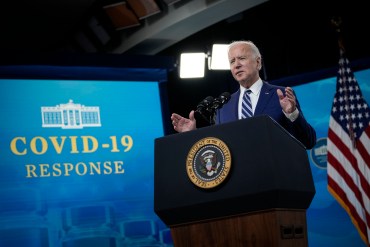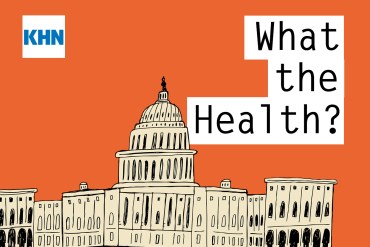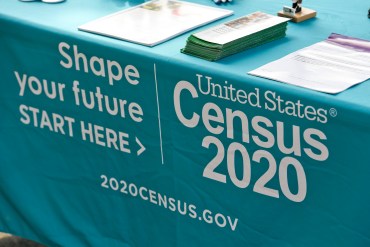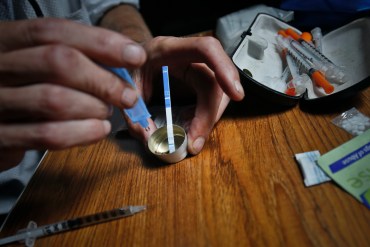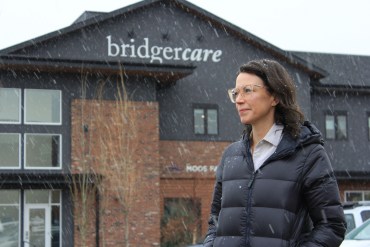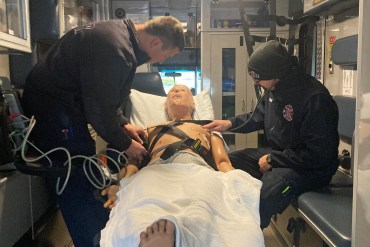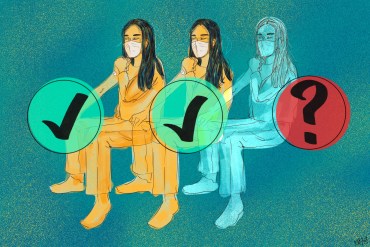Why So Slow? Legislators Take on Insurers’ Delays in Approving Prescribed Treatments
Insurers say prior authorization requirements are intended to reduce wasteful and inappropriate health care spending. But they can baffle patients waiting for approval. And doctors say that insurers have yet to follow through on commitments to improve the process.
States Have Yet to Spend Hundreds of Millions of Federal Dollars to Tackle Covid Health Disparities
A year ago, the Centers for Disease Control and Prevention awarded states and local health departments $2.25 billion to help people of color and other populations at higher risk from covid. But a KHN review shows public health agencies across the country have been slow to spend it.
KHN’s ‘What the Health?’: The Invisible Pandemic
Covid cases are again climbing, but you wouldn’t know it from the behavior of public health and elected officials, much less the general public, all of whom seem to want to put the pandemic in the rearview mirror. Meanwhile, the fallout over the leaked Supreme Court draft opinion on abortion continues even as the Senate fails — again — to muster the votes to write abortion rights into law. Joanne Kenen of the Johns Hopkins Bloomberg School of Public Health and Politico, Alice Miranda Ollstein of Politico, and Sandhya Raman of CQ Roll Call join KHN’s Julie Rovner to discuss these issues and more. Plus, for extra credit, the panelists suggest their favorite health policy stories of the week they think you should read, too.
Census Undercount Threatens Federal Food and Health Programs on Reservations
The 2020 census undercounted people living on Native American reservations. The money for many needed federal aid programs is tied to those population numbers.
Travel Nurses See Swift Change of Fortunes as Covid Money Runs Dry
Travel nurse contracts that were plentiful and paid the temporary nurses far more than hospital staff nurses are vanishing. Hospitals nationwide are turning their energies to recruiting full-time people.
National Addiction Treatment Locator Has Outdated Data and Other Critical Flaws
Three years after a government site launched to connect Americans to treatment, finding addiction care is still a struggle.
As Overdoses Soar, More States Decriminalize Fentanyl Testing Strips
Georgia may soon join a growing list of states decriminalizing the use of fentanyl testing strips. Bans of the strips — on the books in about half of states, experts say — stem from laws criminalizing drug paraphernalia adopted decades ago. But the testing devices are now recommended to help prevent overdose deaths.
Abortion Politics Lead to Power Struggles Over Family Planning Grants
Conservative-leaning states and nonprofit reproductive health care providers are competing over control of states’ Title X funding for family planning programs.
Downsized City Sees Its Health Care Downsized as Hospital Awaits Demolition
A 124-year-old hospital in a midsize Rust Belt city in Indiana will soon be torn down, despite protests from residents and city officials decrying the loss of local health services. The Catholic hospital system said it is downsizing the 226-bed hospital because of a lack of demand for inpatient care, as the organization has been building new hospitals in wealthier suburbs.
Anti-Vaccine Ideology Gains Ground as Lawmakers Seek to Erode Rules for Kids’ Shots
Legislators in Kansas are pushing bills to expand exemptions for school vaccines, allowing religious exemptions for all vaccine requirements in the state’s schools without families having to provide any proof of their beliefs. Similar bills are being introduced around the nation as the anti-vaccine movement gains traction among politicians.
Who Doesn’t Text in 2022? Most State Medicaid Programs
As states prepare for the end of the covid public health emergency, they are making plans to reevaluate each Medicaid enrollee’s eligibility. They will rely primarily on mail and email because not many states can text enrollees.
Refurbished Walkers and Wheelchairs Fill Gaps Created by Supply Chain Problems
Loan closets are playing an important role as supply chain issues and the rising price of aluminum have led to shortages in medical equipment such as wheelchairs, walkers, crutches, and knee scooters.
KHN’s ‘What the Health?’: Finally, a Fix for the ‘Family Glitch’
President Joe Biden welcomed former President Barack Obama back to the White House this week to announce a new policy for the Affordable Care Act that would make subsidies available to more families with unaffordable employer coverage. Meanwhile, Congress struggled to find a compromise for continued federal funding of covid-19 vaccines, testing, and treatments. Tami Luhby of CNN, Shefali Luthra of The 19th, and Jessie Hellmann of CQ Roll Call join KHN’s Julie Rovner to discuss these issues and more.
The Pandemic Exacerbates the ‘Paramedic Paradox’ in Rural America
Emergency medical services are a lifeline in regions with scarce medical care. But paramedics, trained to respond to patients with life-threatening injuries, are in short supply where they’re needed most.
Doctors Trying to Prescribe Abortion Pills Across State Lines Stymied by Legislation
Some doctors are getting licensed in multiple states so they can use telemedicine and mail-order pharmacies to provide medication abortions to more women. At the same time, states are cracking down on telemedicine abortions, blunting the efforts of out-of-state doctors.
Patients’ Perilous Months-Long Waiting for Medicaid Coverage Is a Sign of What’s to Come
The pandemic crisis has overwhelmed understaffed state Medicaid agencies, already delaying access to the insurance program in Missouri. As the public health emergency ends, low-income people nationwide could find it even harder to have coverage.
Pandemic Funding Is Running Out for Community Health Workers
Illinois used federal pandemic money to hire community health workers who connect people with food banks and rental assistance programs, just like public health officials have long hoped to do. What will happen to the community trust that has been built up when the federal money runs out and the workers disappear?
‘The Danger Is Still There’ ― As Omicron Lurks, Native Americans Are Wary of Boosters
Federal data shows that vaccination rates for American Indians and Alaska Natives were some of the highest in the nation, but tribes say resistance has slowed efforts to boost members.
Delays for Autism Diagnosis and Treatment Grew Even Longer During the Pandemic
Despite increased public awareness, research advances, and wider insurance coverage for autism therapies, children often wait months — in some cases more than a year — to get an autism diagnosis and begin intervention services. The waits can be longer for Black and Latino children, and families in rural areas are also disadvantaged, without access to providers.
Missouri Tried to Fix Its Doctor Shortage. Now the Fix May Need Fixing.
Five states have created “assistant physician” licenses that allow medical school graduates to practice without completing residency training. But a federal indictment in Missouri of one assistant physician has some original supporters trying to rein in the medical specialty.





